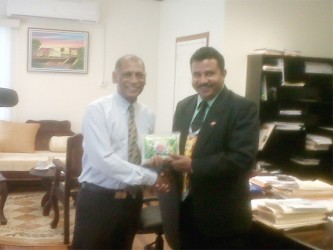With Guyana already helping Trinidad and Tobago to meet its coconut water needs, the two countries are now looking at new areas for agricultural trade and cooperation, with the ultimate aim of reducing their food import bills.
Top officials from the two sister Caricom states say that on the front burner are rice production, agro-processing and research.
But at a news conference yesterday, Minister of Agri-culture Dr. Leslie Ramsammy and Trinidad and Tobago’s Minister of Food Production Jairam Seemungal both remained tightlipped on specifics, saying that details of their plans will be made public after consultations with their respective governments.
The collaboration between the two countries falls under the Jagdeo Initiative—an agricultural strategic programme aimed at boosting farming throughout the Caricom region and guaranteeing food security. This would see bartering of agricultural produce in the Caricom Community and would not only enable healthier eating but would reduce food imports from international markets. Further, it is envisaged that the initiative would create more employment, increase export earnings and give farmers new and technologically-advanced ways of farming, among other benefits.

“The collaboration between Trinidad and Tobago and Guyana is around that issue, how we can work to reduce our national food import and the regional food bill import from outside the region… looking to see how we could produce some of the things we import… and reduce importation from outside the region,” Ramsammy explain-ed.
Caricom’s food import bill per year is an estimated US4 billion.
Ramsammy said the Caribbean has the distinction of being the worst sub-region in the world when it comes to food importation. “At least seven countries in our region today have an importation bill of more than US$500 per capita and a net food producer like Guyana averages [a] per capita food importation bill of about US$250 per year. This is in a world where the average importation per capita is US$66,” he noted. “In particular, we have been addressing the very high import bill, the food import bill in the Caribbean…Trinidad has been addressing this by advancing agriculture… and Guyana has been doing the same…our various governments are concerned, particularly after the 2008 food spikes and in 2012 after the rising cost of corn,” he further stated.
Ramsammy outlined the benefits of collaboration, explaining that Guyana has a lot to gain especially in the area of agro-processing. He pointed out that Trinidad purchases coconut water from Guyana, since that country does not produce enough to meet its export demands and this was one area that Guyana can learn from and see ways of earning.
Cassava, he added, is also bought in bulk amounts by Trinidad and Tobago, which processes it into cassava chips, then resells it to Guya-nese. “Trinidad, in expertise, in specific areas…there are things we will rely on them and our people will go there rather than duplicating each other and similarly they will,” Ramsammy said.
The removal of non-tariff barriers and other constraints to the movement of food through the region is also to be discussed. “We will be looking at the high cost of moving food around and the constraints… non tariff barriers in a community that is seeking free trade among ourselves we all confess… but within our own borders we have constraints that prevent free movement of food and other commodities,” he also said.
He further underscored the importance of the region undertaking its own research and not depending on developed nations for it. “We have to promote research in terms of agriculture in the region. We cannot rely on the develop countries handing down things to us,” he added.
Impressed by rice farming in Guyana, Seemungal said that it was an area he knows that his country can benefit from, although he knows that Trinidad does not possess the land mass necessary for large-scale rice planting as in Guyana.
He said, “I think it is one of the best I’ve seen and can be compared to Japan and Brazil, in terms of what you all have done and what you all are capable of doing with respect to sustaining that rice industry. In terms of crop, we’re already looking at your rice research facility and in Trinidad we have been advancing our vegetable production… we are exploring greenhouse type facilities because our land space is much limited. So, we’re trying to do much similar things to you but in a smaller scale.”
Recognising that labour was a problem in the Caricom region, Seemungal also said that his country is exploring mechanised farming. “In Trinidad we are exploring mechanised systems of creating that environment for young people to engage in agriculture because more and more the labour becomes a challenge,” he added.





